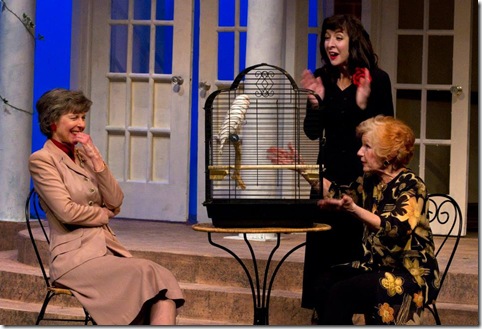OLT Beats The Odds With Sabrina Fair
Photo. Maria Vartanova
The problem with Samuel Taylor’s 1953 comedy, Sabrina Fair, is the film version released by Paramount a year later.
The play begins with Sabrina, a chauffeur’s daughter, returning to the only real home she has known — a wealthy Long Island estate — after five years in Paris. Now an attractive young woman, she radiates poise and sophistication, but an infectious buoyancy also surfaces. The romantic yearnings of her adolescence also re-emerge — yearnings for the unattainable that suggest she doesn’t know her place in the social strata and is therefore destined to send the plot spinning into merry overdrive.
In the film, writer-director Billy Wilder bolstered this material with a solid back story so that we first see Sabrina as the dreamy, dangerously impressionable child she was before going to Paris. Playwright Samuel Taylor was so upset by this that he dissociated himself from the screen version — but the truth is that Wilder had improved on the original, giving it more substance and more social bite. Wilder also was playing an ace card in casting Audrey Hepburn — who, after her triumph in Roman Holiday, was the hottest new actress in Hollywood — in the title role.
The play that came first ended up haunted by the movie that came afterwards, and in particular by the ghost of Audrey Hepburn. That’s the challenge facing Ottawa Little Theatre in its new production of Taylor’s play. And of course it’s the prime challenge confronting the actress playing Sabrina — in danger of being damned if she doesn’t remind audiences of the legendary Audrey and equally vulnerable if she does.
So how well does Jane Chambers manage in navigating her way through a decidedly tricky assignment?
She’s splendid when it comes to body language: she moves beautifully and there’s a natural confidence in the way she wears the lovely outfits provided her by designer Susan MacKinlay, whose costuming is one of the high points of the evening. However, things would be easier for Chambers had she been able to give us a contrasting glimpse of the starry-eyed adolescent Sabrina once was — but, alas, it’s not the movie we’re watching. So she must start defining her character in a few quick strokes when, in a flurry of excitement, Sabrina returns to the tony, upper-class world of the Larrabee family, long-time employers of her father. There’s a bit of strain evident here, and as Chambers’ Sabrina chatters away, the inhibitions of her past replaced by a natural effervescence, the mercurial Hepburn image does begin intruding.
Perhaps it can’t be helped: The rhythms and cadences of the dialogue supplied this character might well invite some kind of quicksilver response from any performer playing Sabrina. But although Chambers may not completely make the role her own, but her take on Sabrina does start acquiring its own distinctive life. It also is attentive to the reality of this play.
Sabrina Fair, among other things, is about class — an issue that certainly rears its head in the main plot line concerning Sabrina’s own romantic dreams. Which of the the two Larrabee brothers does she really want to marry? Surely playboy David (Phillip Merriman) on whom she has had a crush since adolescence. Surely not Linus Jr (Josh Sparks), the more solid of the two siblings in his dedication to increasing the family fortunes. Director Venetia Lawless can’t quite manage to keep the audience in suspense about the outcome of this dilemma, but she can ensure a lively pace and keeps the crisp, funny and often edgy dialogue bouncing along.
As the two brothers, Sparks and Merriman are likeable, and confident in their performances, but somewhat interchangeable thanks to their failure to give us two separately defined personalities; for all the moments of neatly rendered comedy, the play’s emotional stakes shouldn’t seem merely frivolous. As their aging patriarch of a father, Geoff Gruson rightly judges that Linus Larrabee Sr. is more bombast than bite, although at times this is less a characterization than an entertaining progression of harrumphs. Meanwhile, Jane Morris shows the right level of cool serenity in portraying his spouse, the stabilizing factor in his life.
Cheryl Jackson, terrific as tart-tongued Aunt Julia, makes every line count. And Bob Hicks, in an outstanding performance as Sabrina’s chauffeur father, is clearly an employee who knows his place — until the moment when he takes control of the evening with a series of confessions that bring down the house. By this point, you’re also convinced that OLT has delivered a solid evening of entertainment. And, by the way, it also looks great, thanks to those costumes and Graham Price’s set.
Sabrina Fair continues at Ottawa little Theatre to March 7.
Sabrina Fair
By Samuel A. Taylor
Ottawa Little Theatre
Director: Venetia Lawless
Set: Graham Price
Lighting: John Solmon
Sound: Lindsay Wilson
Costumes: Susan MacKinlay
Cast:
Maude Larrabee……………………………………Jane Morris
Julia Ward McKinlock…………………………….Cheryl Jackson
Linus Larrabee Jr…………………………………..Josh Sparks
Linus Larrabbee Sr…………………………………Geoff Gruson
Margaret…………………………………………….Roberta Robert
David Larrabee……………………………………..Phillip Merriman
Gretchen…………………………………………….Kate Corrigan
Sabrina………………………………………………Jane Chambers
Fairchild…………………………………………….Bob Hicks
Maurice…………………….Zorro, Benny, Norton, George or Lewis
Young men……………………………Tim Ginley, Max Chambers
Young women………………………Lydia Sarah Riding, Gabrielle Anderson
Paul D’Argenson………………………………….Alexandru Moldovan
